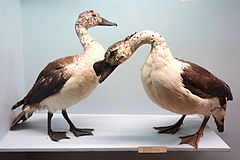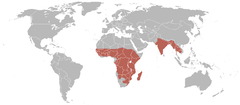Comb duck
| Knob-billed duck | |
|---|---|
 |
|
| Sarkidiornis melanotos (female, male) | |
| Scientific classification | |
| Kingdom: | Animalia |
| Phylum: | Chordata |
| Class: | Aves |
| Order: | Anseriformes |
| Family: | Anatidae |
| Subfamily: | Tadorninae or Anatinae |
| Genus: |
Sarkidiornis Eyton, 1838 |
| Species: | S. melanotos |
| Binomial name | |
|
Sarkidiornis melanotos (Pennant, 1769) |
|
| Subspecies | |
|
S. m. melanotos (Pennant, 1769) |
|
 |
|
| Global range | |
| Synonyms | |
|
Anser melanotos Pennant, 1769 |
|
S. m. melanotos (Pennant, 1769)
S. m. sylvicola Ihering & Ihering, 1907
Anser melanotos Pennant, 1769
The knob-billed duck (Sarkidiornis melanotos), or comb duck, is an unusual, pan-tropical duck, found in tropical wetlands in sub-Saharan Africa, Madagascar and south Asia from Pakistan to Laos and extreme southern China. It also occurs in continental South America south to the Paraguay River region in eastern Paraguay, southeastern Brazil and the extreme northeast of Argentina, and as a vagrant on Trinidad.
It is the only known species of the genus Sarkidiornis. The supposed extinct "Mauritian comb duck" is based on misidentified remains of the Mauritian shelduck (Alopochen mauritianus); this was realized as early as 1897, but the mistaken identity can still occasionally be found in recent sources.
This common species is unmistakable. It is one of the largest species of duck. Length can range from 56 to 76 cm (22 to 30 in), wingspan ranges from 116 to 145 cm (46 to 57 in) and weight from 1.03 to 2.9 kg (2.3 to 6.4 lb). Adults have a white head freckled with dark spots, and a pure white neck and underparts. The upperparts are glossy blue-black upperparts, with bluish and greenish iridescence especially prominent on the secondaries (lower arm feathers). The male is much larger than the female, and has a large black knob on the bill. Young birds are dull buff below and on the face and neck, with dull brown upperparts, top of the head and eyestripe.
...
Wikipedia

